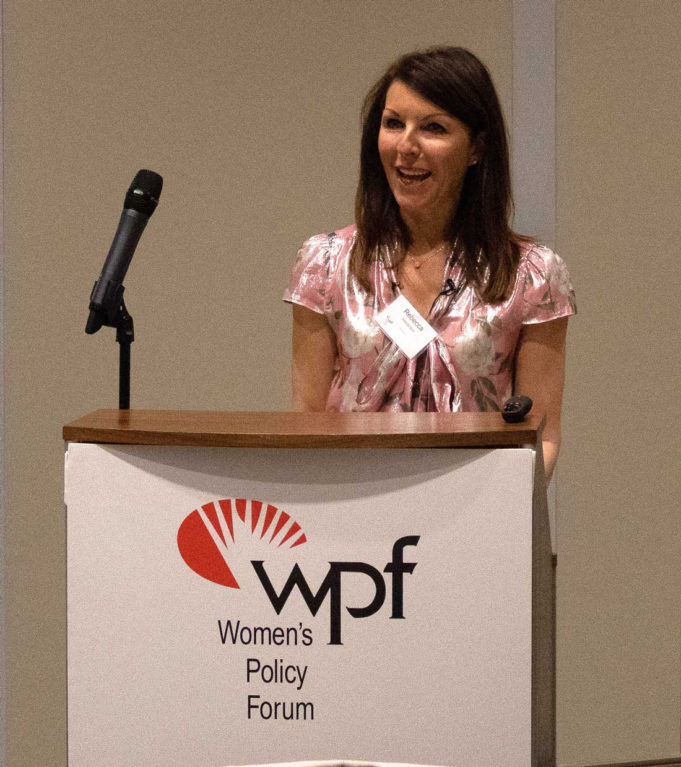The struggle for gender equality is far from over.
“Women of color suffer doubly because of sexism and racism, which is institutionalized in many cases,” said Alfreda Norman, senior vice president at the Dallas Federal Reserve. “Black women earn 63 cents for [every dollar their white colleagues earn], while Hispanics earn 34 cents. It takes a typical black woman in this country 19 months to be paid what a white man earns in 12 months.”
Norman was one of several speakers at a recent symposium at Lena Pope led by Women’s Policy Forum, an organization of female business leaders that works to improve the lives of women in Tarrant County. Forum CEO Karen Myers opened the four-hour powwow billed “Closing the Gender Gap: Its Effects on Women, Families, and the Economy.”
When it came to spotlighting the issue that disproportionately affects women, Myers told the crowd, “One issue stood out. No other issue was even close. The stark disparities took my breath away. We hope this starts a dialogue. It affects families, economies, and communities.”
The wage gap between men and women has steadily narrowed since passage of the Equal Pay Act in 1963 — from roughly 60 cents for every dollar earned by males to 80. The earnings disparity between men and women of color, however, remains far worse. With Texas’ current glacial slog toward salary parity, our state won’t realize equal pay between the sexes until 2049, according to a new report by the Dallas Women’s Foundation, a nonprofit that provides grants for women’s causes. Last Friday at Lena Pope, dozens of female business and community leaders gathered to say that is not soon enough.
Using data from the federal government and Dallas Women’s Foundation, Myers’ group highlighted the economic realities of women working in Tarrant County through handouts and projected graphs.
“If working women in Texas were paid the same amount as comparable men, their average annual earnings increase would be $7,300, and [the female] poverty rate would be reduced by 51 percent,” a bullet point stated.
Keynote speaker Rebecca Henderson, CEO of the talent acquisition company Randstad Sourceright, focused on the factors that lead to workplace pay inequality.
“We still see parental shaming” in the workplace, Henderson said, referring to the guilt women are expected to feel for returning to work after giving birth. “ ‘Wow, you’re coming back to work already.’ Women don’t feel good about coming back to work, so they often don’t. They’ll take a year off because they don’t want childcare. Our motivator becomes guilt and fear and not career choices, and so women take another back seat.”
Henderson outlined several workplace policies that can create a more level playing field for male and female employees. First, she said, ask your business to look at male versus female staffing and salary numbers.
“You can’t do anything unless you know where you’re at” with regard to gender equality, she said.
Second, expand paternity leave for women and men. Texas lacks any statewide paternity leave laws, but that doesn’t give individual businesses a free pass, she said. Third, set gender targets for recruiting. Finally, establish a system of mentors for women employees.
“Women [are generally more reluctant] to ask for equal pay,” she said. “Providing training to male managers makes a difference. Men with daughters, in my experience, have their heads up [on this issue]. Turn those men into mentors. They will push women to ask for fair pay.”
Henderson’s speech was followed by two panel discussions: “Math not Myth” and “Changing the Gender Paradigm.”
TCU professor Tracey Rockett highlighted the need for the United States to join the vast majority of developed countries and implement a minimum standard for maternity and paternity leave. One of her last comments drew the biggest applause of the day.
“Either [elementary] schools need to end at 5 [p.m.], when work ends, or work needs to end at 3 [p.m.], when school ends,” she said. “How many of you had to leave a meeting early because you have to pick up kids? This disproportionately affects women.”
The session ended with calls to action from community leader Jennifer Treviño and Fort Worth Assistant City Manager Susan Alanis.
“I’d like to see some new faces,” Alanis said, referring to the need for new volunteers on Fort Worth task forces and committees.
She described a new city-appointed task force on the status of women that will examine pay equity and ways to support early childhood education within Fort Worth in 2019.
“We’ll be truthful,” she said. “We’ll look at the city as an employer. This is important to Mayor [Betsy] Price.”
Treviño commended women for voting to push for changes, but she added a caveat.
“You know what we’re not doing?” she said. “Every single person in here, you’re active in the community, but one thing that we’re not doing is running for office. At all levels. Think about that. Get girls in your life exposed to every part of the political process.”












